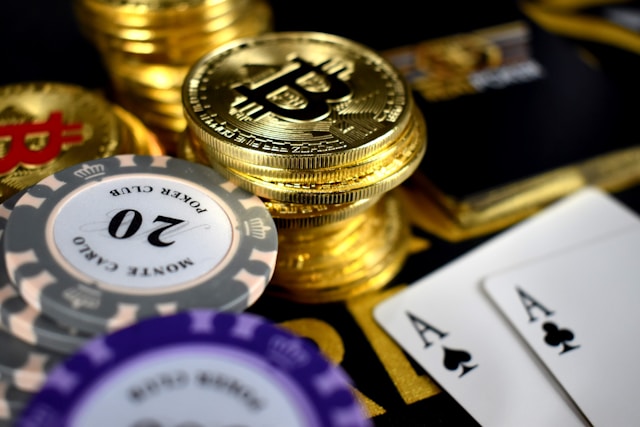Unlike traditional fiat currencies like the dollar or euro, the type of cryptocurrency you use for poker matters more than you think. This isn’t just about the convenience crypto offers or what’s trending on social media. It can actually impact your bankroll’s stability, how quickly you can withdraw your winnings, and the value of your winnings. As more platforms accept cryptocurrencies, choosing the right one should be a part of your strategy.
Some established tokens like Bitcoin are trusted and widely used, while others are fast and cheap to transfer. Some meme coins, on the other hand, are built more on hype than substance. Knowing this important detail can save you time, money, and headaches.
A lesser-known but important fact is just how your chosen token influences your overall strategy and experience. Many crypto users active in poker leverage trading as a strategy to increase the size of their position. In other words, actively trading crypto tokens can potentially increase a player’s bankroll by timing the market. Technical as it sounds, using the same token for poker deposits and withdrawals effectively reduces bankroll depletion, while it is unrelated to playing poker, it does impact the token’s value, which impacts your bankroll and winning. Trading effectively provides liquidity in the long run.
Stablecoins like USDT or Tether offer some insulation from volatility. These coins stay pegged to the US dollar, so their value doesn’t swing wildly while you're playing or when you're cashing out. Trading tokens and selecting a specific token for poker should be considered a dual approach to keeping your bankroll balanced, reducing risk, and volatility.
Despite being slower than many alternatives, Bitcoin is still the most widely accepted cryptocurrency in online gambling. Its popularity ensures support on nearly every crypto gambling platform. It's also easy to buy, sell, and convert. The trade-off, unfortunately, means higher transaction fees and occasional delays during times of network congestion.
Ethereum has a strong following, especially among those who appreciate transparency. Many sites use Ethereum’s smart contracts to guarantee fair play and automate payouts. The network has improved its speed thanks to upgrades, but transaction fees can still spike when traffic is heavy. If you’re planning to join multiple tournaments in one sitting, keep an eye on the fees or consider alternatives for smaller buy-ins.
Stablecoins are surging in popularity since they hold their value. USDT and USDC are pegged to the US dollar, so you don’t have to worry about your bankroll shrinking overnight due to unpredictable market changes. They’re especially useful for high-stakes players who don’t want to juggle price speculation while trying to focus on the game. Most major platforms support at least one of these options, often on multiple networks like Tron or Ethereum, making transactions fast and cheap.
Solana has built a strong reputation as a fast, low-cost option for poker players. Transactions settle in seconds, and fees are minimal. More sites are beginning to support it, especially those targeting crypto-savvy players looking for performance. While it’s still not as universally accepted as Bitcoin or Ethereum, that’s changing quickly. It’s a solid choice if you value speed and want to avoid overpaying just to get your funds in or out.
BNB is favored by players who use multi-chain poker platforms or are already within the Binance ecosystem. Its strength lies in fast transactions and low fees, much like Solana. Some platforms also offer promotions or discounts for players using BNB. The downside is that it’s not as broadly supported outside of Binance-aligned services. If your poker site accepts it, though, it’s well worth considering.
Litecoin has long been a solid performer in crypto gambling. It’s considered much faster than Bitcoin and cheaper to use, though not accepted as widely. TRON is often supported on sites with a focus on Asian markets. Both offer quick, affordable transfers and have stable technology behind them, but availability will vary depending on where you play.
Meme coins like Dogecoin and Shiba Inu have found their way into some online casino platforms, often tied to low-cost transactions. While the low cost and hype can be fun, the lack of price stability and security make them a poor choice for serious poker players. If you're playing casually and don’t mind the volatility, they can be entertaining. Just don’t expect long-term reliability.
Always check what your preferred poker site accepts before choosing a coin. Some platforms might support multiple cryptocurrencies, while others may be limited. Consider how fast deposits and withdrawals are processed, and whether you’ll be hit with network fees. Timing can also matter since transferring during high-traffic periods can cost more, especially with Ethereum or Bitcoin.
Poker tournaments already require skill, discipline, and sharp decision-making. The cryptocurrency you choose to fund poker gaming should support that, and not work against it. Bitcoin and Ethereum continue to be widely trusted. Stablecoins offer calm in a volatile space. Solana, BNB, and Litecoin are proving themselves on performance and cost. Meme coins may be entertaining, but they’re best left for low-stakes experiments rather than real tournament entries.

